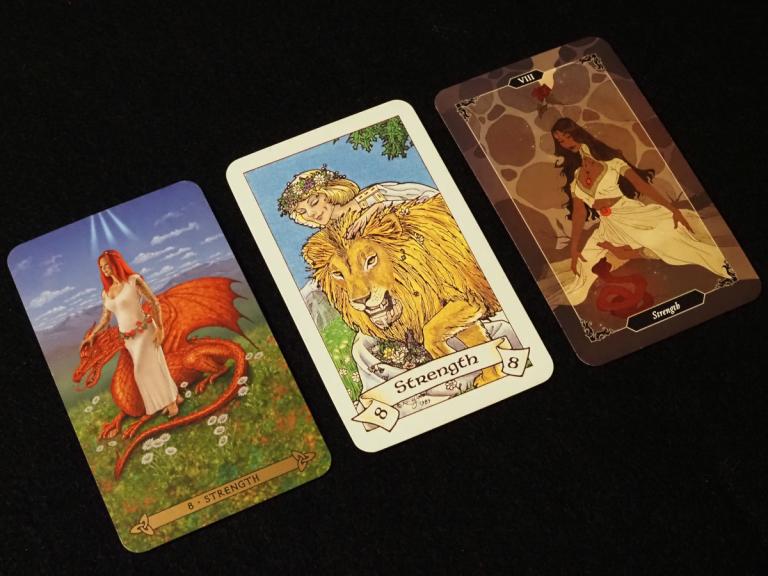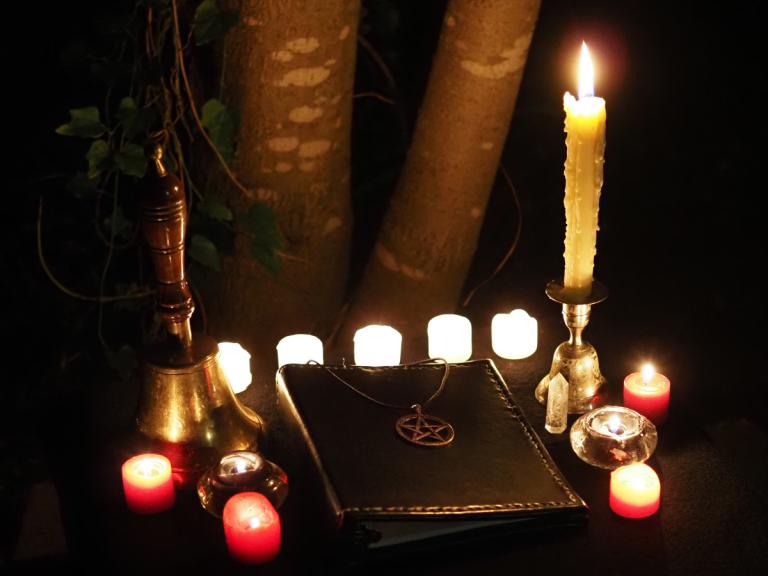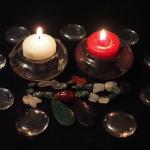Sometimes you have to choose a side.
I’m usually an advocate of “wait and see” “maintain optionality” and “don’t make a decision until you have to.” The longer you wait, the more information you’ll have, the more things will play out, and the better decision you can make when you do make it.
But sometimes circumstances demand a decision now. Sometimes it becomes evident that the approach you hoped would work, isn’t working. Your goals depended on other people who decided to go in a different direction, so it’s time to reorient your efforts toward things that are within your control.
And sometimes you need to not just choose a side, but declare a side. This is one of those times. I’m choosing a side.
I choose witchcraft.
This is who and what the United States of America is
I have always been on the side of building a compassionate and multicultural society, and I remain on firmly that side.
The West in general and the United States in particular made great progress in that direction in the 20th and 21st centuries. I love the Theodore Parker quote adopted by both Martin Luther King Jr. and Barack Obama: “the arc of the moral universe is long, but it bends toward justice.”
I didn’t realize how many people were trying to bend it back the other way. Any delusions were firmly squashed early last Wednesday morning when it became clear that Donald Trump had won not just the electoral vote, but also the popular vote.
We can’t blame the election on cheating, foreign interference, a bad candidate, or a bad campaign strategy. Oh, I’ve seen plenty of people doing all of the above, but they’re refusing to acknowledge the unpleasant truth: over half of America either likes authoritarian nationalist rulers, or they’re OK with them if they promise to lower the price of eggs.
Those of us who have long ridiculed the idea of “American exceptionalism” shouldn’t be surprised. We’ve seen the same thing throughout Europe and the rest of the world. The UK voted for Brexit, and they only kicked the Conservative Party out of office after 14 years because they wanted a change and the Labour Party was the only viable choice.
Too many people don’t want a compassionate multicultural society. They want a society where their culture is the one and only norm and a strong leader keeps everyone else under control, or simply out.
This is who and what the United States of America is in 2024.
Elections alone will not save us
In 2008, then-candidate Barack Obama came under fire because the minister at his church – the Rev. Jeremiah Wright, pastor of the Trinity United Church of Christ in Chicago – preached a sermon that included the line “God damn America.” Rev. Wright called out slavery, genocide of Native Americans, foreign wars, and continued discrimination as reasons for cursing rather than blessing America.
Even if you disagree with that one line, this is a fine sermon in the tradition of the Black church. It’s titled “Confusing God and Government” and it’s a textbook three-point sermon:
- Governments lie
- Governments change
- Where governments fail, God never fails
As a Pagan and a polytheist I would say that somewhat differently, but his core message was spot-on. If you’re counting on government to save you, you’re always going to be disappointed.
Democracy only works when people of good will participate. We have an obligation to vote in every race in every election, and to otherwise actively participate in the political process. But voting isn’t the only thing we can do, and voting alone won’t save us.
Last week I shared a piece from Margaret Killjoy titled The Sky is Falling; We’ve Got This. I shared it for her critically important line “de-escalate all conflict that isn’t with the enemy.” Another important line is:
“the biggest problem with election years is that we seem to collectively forget that we have agency outside of voting”
Margaret speaks as political activist. That’s one way to respond to the trouble we find ourselves in. But it’s not the only way – there are many.
I choose witchcraft.
How I got here
I always wanted to be a witch.
The first time I saw witchcraft on TV as a small child, I immediately knew two things. First, I knew what I was watching was fiction. And second, I knew there was a reality behind the fiction. It took me almost 30 years to find that reality.
Even then, things didn’t work out the way I had hoped – mainly because I hadn’t dealt with my religious baggage. When I started that process, I discovered Druidry. That was a very good fit for me, and “Druid” quickly became my primary spiritual identity. I soon added “Pagan” and “polytheist” to my identity, along with my role as a priest.
Magic has always been a part of my practice. Druidry – both ancient and modern – has plenty of room for magic, so I saw no need adopt the identity and/or title of “witch.” I thought about it, but it seemed superfluous.
I found myself writing about witchcraft a lot, and I usually added a disclaimer that I didn’t call myself a witch – mainly to keep myself out of the never-ending arguments about who is or isn’t a witch.
My good friend and fellow Denton CUUPS leader Cynthia Talbot (who’s been a witch longer than I’ve been a Druid) and I often find ourselves at odds with stereotypes. She casts a circle with a sickle (the traditional tool of the Druids) and I use a wand. At a recent Sunday service we co-led, I wore all black and she wore Fall nature colors. But we’ve always done magic together seamlessly – her witchcraft and my Druidry differ in emphasis, not in essentials.
But that began to change in 2022.
Claiming the identity of a witch
We called our 2022 CUUPS’ Samhain circle “A Witches’ Samhain.” It was inspired by Heather Green’s post-Dobbs article “How to make a thousand witches with one Supreme Court decision.” We wanted to invite people to begin their own witchcraft practice, but we emphasized that this was a serious decision. Our liturgy included this line:
“I charge you again, that witchcraft is not a gift. It is a craft. And like all crafts it requires practice and work. It requires sacrifice.”
Cyn and I co-wrote the ritual. I participated in it fully, “freely and of my own will” – words I think I wrote myself. The ritual was powerful, and after that I started thinking about witchcraft more seriously.
The next step on this journey came at Austin Witchfest in March 2023. Jason Mankey was the Guest of Honor. He led a ritual called “The Gifts of the WitchFather” and he asked me to take a small part in it. Of course I said yes.
During the ritual, Jason said “to be a witch is to choose a side” – to choose Nature and to choose freedom. After that I knew I had to not just choose a side, but to cross a line.
That came on the full moon immediately before Samhain last year. It was a rather informal ceremony – Cyn asked me about five times “are you sure you want to do this?” Each time I said “yes.” And then I did some other things not for publication (that whole “keep silence” thing, but if you’re guessing I assure you you’re wrong).
I chose witchcraft.
I choose it again now. Because it’s necessary, and because I want to.
Doing the work of a witch
What does it mean to choose witchcraft? What does it mean to be a witch?
Lots of people have lots of different answers. While I’m not interested in arguing with them, I do have my own answers.
Witchcraft is unauthorized magic – magic done for the witch’s own reasons without the blessings of church, state, or mainstream society. A witch is someone who does witchcraft.
There was a time when I called myself a magician, in recognition of the fact that I do work magic on a regular basis. Just as there have always been witches, there have always been magicians – people who worked magic that, if not exactly authorized, was at least protected by power and wealth. John Dee is a good example. He was the court astrologer – and likely, the court magician – to Elizabeth I.
There are magicians working for the other side right now, even though most of them would not use that term for themselves. They’re trying to create change in conformance with their will… or more precisely, in conformance with the will of the politicians who are paying them.
Witchcraft has always been the magic of the people who had nowhere else to go. While I have enough privilege to live in relative safety (Pagans are on the Christian Nationalists’ list, but we’re pretty far down the list), I am just as thwarted as everyone else in my attempts to build a compassionate and multicultural society through the electoral process. Being a magician isn’t enough.
And so I choose witchcraft.
Embracing the mythology of the witch
One of the keywords of the Strength card in the Tarot is “soft control” – creating change not through force or coercion but through calmness, compassion, resilience, and perseverance.

If you live in a democracy (more or less) and you keep losing elections, you have to convince people that your vision for the future is better for them than the future they’ve been voting for. You rarely accomplish that through debate. You accomplish that by showing them a better way, and you show them by living that way yourself.
The best way to do this – as I see it, at least for me – is to embrace the mythology of the witch. Not the actual history, but rather the stories we tell ourselves about witches and witchcraft.
I start with the myth of the witch as someone on the edge of society. Perhaps the witch lives deep in the woods, but it’s not so deep she can’t be found by those who need her services. Just deep enough that her daily work isn’t interrupted on a regular basis. I need to focus on my own life and my own practice without completely abandoning the mainstream society.
In what I think was the best episode of Agatha All Along, Lilia’s mentor asks her “do you have a coven?” I’ve never been part of an actual coven, but I am thankful I have a small group of local friends to practice with, who I can call on in an emergency and know they’ll answer, and who I support in return. And who I can share a meal or a drink with from time to time. The next few years are going to be difficult – I’m glad I don’t have to go through them alone.
Modern witchcraft is closely connected to Nature, and this is a perfect fit with my Druidry and its emphasis on Nature spirituality. I need to stay connected to the land and the spirits of the land, and to the rhythms and cycles of Nature.
A witch decides a witch’s fate. Our ancestors lived in societies and under governments that were far more repressive than what we have now, or are likely to have in the coming years. They still managed to live good, honorable, and at least occasionally, happy lives. What they did, we can do too.
And we will.
I am still a Pagan, a Druid, and a polytheist
I didn’t write a blog post the day after the full moon last October to announce that I’m now a witch. I haven’t hidden it – I’ve told a few people when the topic came up – but it felt “not quite right” to broadcast it for no good reason.
And now I have a good and necessary reason.
My religious identity has not changed. I’m still a Pagan and a polytheist. I still serve my Gods and my community as a priest.
I’m still a Druid. I’m a member of two Druid orders and I know lots of people who are both Druids and witches. “Druid” is still my primary spiritual identity.
But I am also a witch. I work magic for my own reasons. I embrace the mythology of the witch.
We live in difficult times, times that require a choice.
I choose witchcraft.
“Witchka”
The title of this post comes from a line in S.J. Tucker’s song “Witchka,” from her 2010 album Mischief. It was inspired by a cute encounter S.J. had with a small child, which S.J. turned into a song about a teenage girl who “just bought her first book of spells and she’s going to take over the world, thankyouverymuch.” It’s a reminder to take inspiration where ever you can find it, and, even in these difficult times, to remember to have fun.
A witch decides a witch’s fate.

















